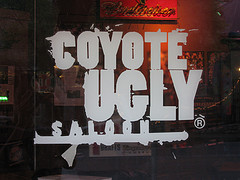Court finds that Coyote president/founder’s blog post and director of operation’s Facebook status update could qualify as “adverse action” against employees for purposes of FLSA retaliation claims—Stewart v. CUS Nashville, LLC, 2013 WL 456482 (M.D.Tenn. Feb. 6, 2013)
We’ve seen cases where employees were disciplined or fired for venting online (see posts here and here). But what about when the employer does the venting? That can create legal problems as well.
Employees of different bars in the well-known Coyote Ugly Saloon franchise filed a class action against corporate entities related to the franchise and Coyote Ugly’s president and founder, Liliana Lovell. The lawsuit claimed violations of the Fair Labor Standards Act. One of the plaintiffs (Stewart), claims that her employer retaliated against her shortly after the lawsuit was filed. The alleged retaliation came in the form of this entry on Lovell’s “Lil Spills” blog, which appears on Coyote Ugly’s website:
“By the way Lil, you should be getting served with a lawsuit. No worries just sign for it”. This particular case will end up pissing me off cause it is coming from someone we terminated for theft. I have to believe in my heart that somewhere down the road, bad people end up facing bad circumstances!
I have been reading the basics of Buddhism and am going to a class on Monday. The Buddhist way would be to find beauty in the situation and release anger knowing that peace will come. Obviously , I am still a very new Buddhist cause my thoughts are ” fuck that bitch”. Let me do my breathing exercises and see if any of my thoughts change. Lol
Stewart claimed that the entry falsely accused of her theft.
A second employee (Stone), claimed that Coyote Ugly’s Director of Operations (Huckaby) made the following post to his Facebook page: “Dear God, please don’t let me kill the girl that is suing me .… that is all …..” Huckaby was intoxicated when he made this post. According to Stone, Huckaby was sitting across the bar from her when he made the post. Stone, who at the time was Facebook friends with Huckaby, saw the post on her phone almost an hour later, but the post was removed the next day. Huckaby did not remember making or removing the Facebook post.
Stone further claimed that Huckaby made retaliatory comments the next night after learning that a customer threatened to sue after falling down some stairs. Huckaby allegedly said: “Why does everyone sue? I’m tired of all these bi***es taking their issues out on our company. They’re f***ing idiots.” Huckaby made the statements while Stone was approximately two feet away. Stone quit her job the next day.
The defendants moved for summary judgment on the two individual retaliation claims. One of the issues relating to Stewart’s claim was whether the Lil Spills blog entry was an “adverse action.” A plaintiff claiming retaliation “must show that a reasonable employee would have found the challenged action material adverse, which in this context means it well might have dissuaded a reasonable worker from making or supporting a charge of discrimination.” Burlington N. & Santa Fe. Ry. V. White, 548 U.S. 53, 67 (2006). Applying that standard, the court found that a blog entry written by the employer’s founder and president accusing an employee of theft could constitute an adverse action. A jury could find that the blog entry would have likely dissuaded a reasonable worker from making or supporting a FLSA claim. Because genuine issues of material fact existed, the court denied summary judgment on Stewart’s retaliation claim.
Similarly, factual issues precluded summary judgment on Stone’s retaliation claim. The court found that a reasonable person could find that Huckaby’s Facebook post was directed at Stone given that he knew she had joined the lawsuit and had made the post while seated across from her at the bar. The Facebook post, together with the comments Huckaby made the following night, could be reasonably construed as the employer’s official hostility toward employees who bring lawsuits against it. The court found that a reasonable person in Stone’s situation would have felt compelled to resign. On the flip side, the court also denied Stone’s motion for summary judgment on the retaliation claim because there were factual disputes over Huckaby’s state of mind. There was no evidence that Huckaby mentioned the lawsuit or Stone’s name while making either of the statements, and it was undisputed that he was drinking in both instances.
LegalTXTS Lesson: Authenticity can be an important part of a company’s brand or social engagement strategy, but sometimes a company’s self-expression can go too far. As this case illustrates, even stray remarks can have legal consequences. Like employees, employers need to exercise good judgment when posting content online. Complaining about employees on the Internet rarely constitutes good judgment. This is especially true if managers are connected to their subordinates on the same social network and therefore share content with each other.

